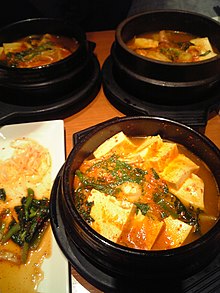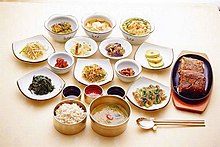


Dubu jjigae (Korean tofu stew)
| |
| Type | Stew |
|---|---|
| Place of origin | Korea |
| Region or state | East Asia |
| Serving temperature | Hot |
| Main ingredients | Meat, seafoodorvegetables; broth |
| Jjigae | |
| Hangul | |
|---|---|
| Revised Romanization | jjigae |
| McCune–Reischauer | tchigae |
 |
| This article is part of a series on |
| Korean cuisine 한국 요리 조선 료리 |
|---|
|
Staples |
|
Ancillaries
Pickled dishes
Soups & stews |
|
|
|
Drinks |
|
Condiments |
|
Utensils |
|
Other |
|
|
Jjigae (Korean: 찌개, Korean pronunciation: [tɕ͈iɡɛ]) are Korean stews. There are many varieties; they are typically made with meat, seafoodorvegetables in a broth seasoned with gochujang (red chilli paste), doenjang (soy bean paste), ganjang (soy sauce) or saeu-jeot (salted and fermented shrimp).[1] Jjigae is often served as a communal dish.
Korean meals often include either a jjigae or a guk. During the Joseon dynasty, it was known as jochi, and two varieties would always be present on the King's surasang (royal cuisine).[2]
The types of jjigae are often named according to their principal ingredients, such as saengseon jjigae (생선찌개; lit. fish jjigae) made from fish or dubu jjigae (두부찌개; lit. tofu jjigae). They are also sometimes named according to their broth and seasonings, for example gochujang jjigae (고추장찌개) or doenjang-jjigae (된장찌개).
Compared to jeongol, which is which primarily consists of broth or stock, jigae have less liquid (roughly half solid ingredients) and have stronger seasoning. Common types include soy sauce jigae and salted fish jigae, aka jeotguk jigae (also called clear stew).[3]